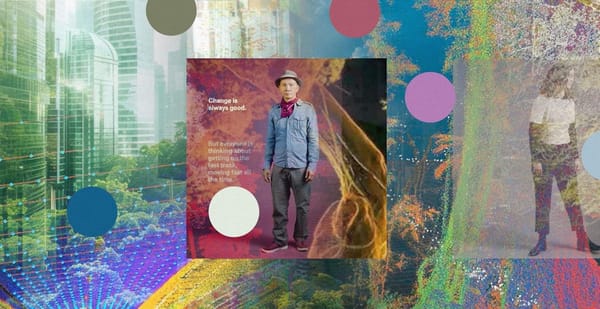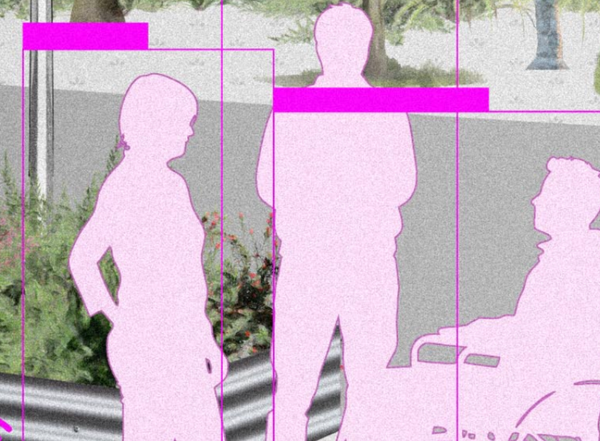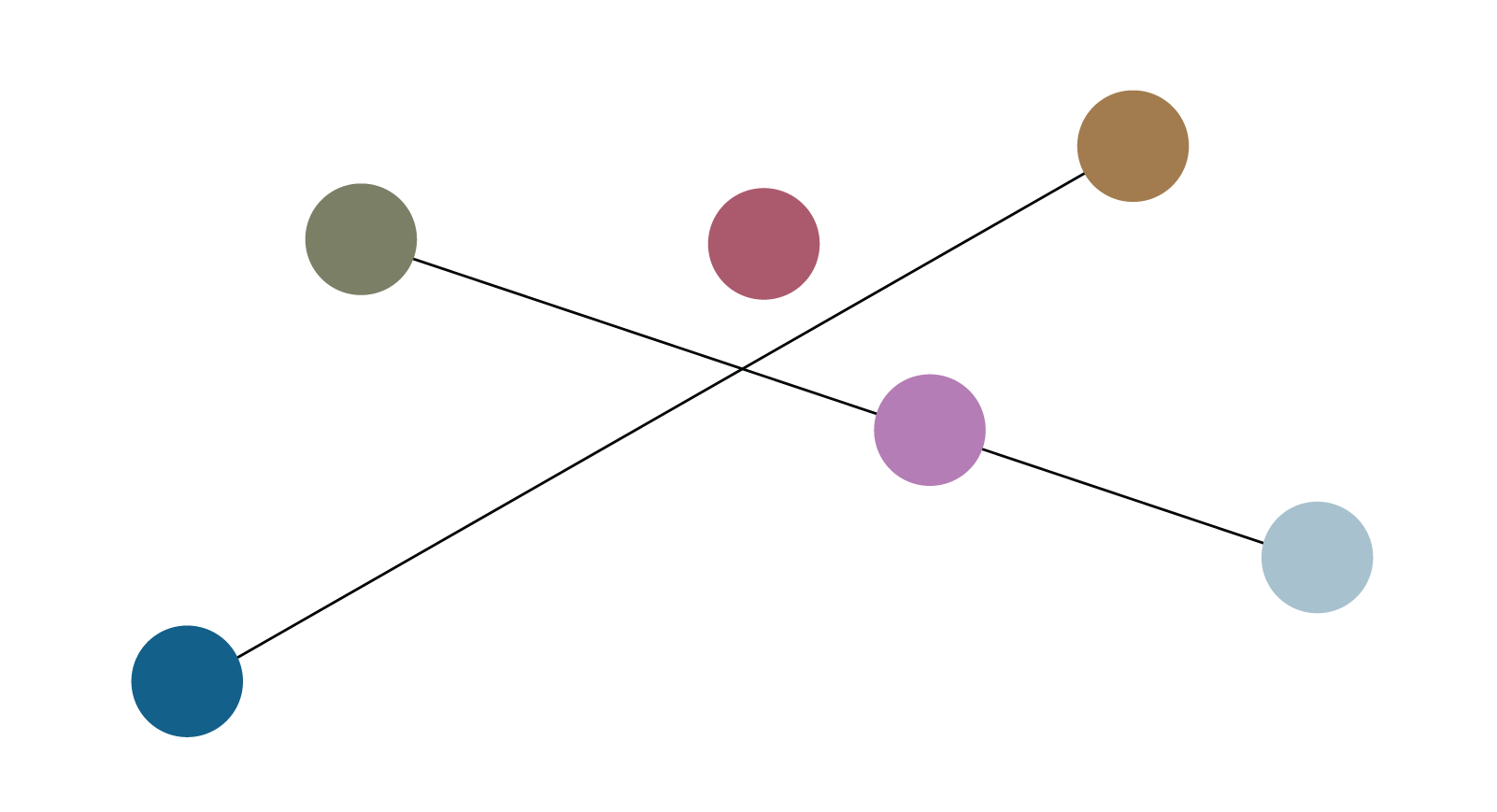
Somehow, in the not too distant past, who we are as citizens changed. Our allegiances shifted, our field of vision changed. Our everyday sensory realities morphed. Somehow, we became citizens of a different kind of political order. Through this change, we became citizens of novel training grounds for a new kind of intelligence. This intelligence became known to us as 'artificial intelligence', or simply, AI.
When AI, specifically gen-AI (generative AI) was unleashed as a consumer product, it set in motion the potential for different kinds of relational interfaces between citizens and their informational architectures. We're told often enough this is a critical moment in the history of the internet—a transformation of how we build communities, economies, entire societies. I hear this everywhere. And yet I find myself wondering: if we are citizens of training grounds for new kinds of intelligence, what version of citizenship are we actually living? And what, in this moment of re-thinking relational interfaces, could actually change?
What I Think I'm Beginning to Understand
Understanding the implications of large-scale informational design has for too long been a narrowly technical or academic pursuit, not a question of citizenship practices. Let's face it, a term like 'platform architecture' or 'platform ecosystem' doesn't really attract a large-scale audience, or build a large Instagram following.
And yet, this organisational form - the form of the platform - is the dominant, most successful form of large-scale organisational management the planet has ever seen. Its an approach to information management that gets studied from the perspective of economics, technology, news, media, and urbanisation. But somehow, understanding platforms as political entities doesn't gain much traction, especially in policy circles. Regulators consider 'digital platforms' as technology companies, not sovereign political organisations increasingly capable of evading the influence of the nation state. But this era of AI may in fact test this state of affairs, causing the curtain to drop.
Somehow, unwittingly, we have become citizens of different kinds of political institutions. Their planetary scope means, in turn, that we have become planetary citizens. Citizens of institutions that are novel in their design, their scope, and, increasingly, their intelligence. What on earth can this mean?
I am willing to be disputed on this, and one day perhaps be proven wrong: that today's major technology platforms, call them AI companies, will not succeed in their missions and will not eclipse the sovereign capacities of the nation state. But in the meantime, I do think we need stronger intellectual engagement with what it means to live as a planetary citizen today.
What does it mean to accept our political status planetary citizens?
It begins by recognising platform companies' sovereign power. Many governments today seem unable to effectively regulate technology companies because of the interdependence between governments, citizens, and these technologies. When I accept this uncomfortable reality, I also see a case for demanding that technology companies evolve beyond profit maximisation toward societal and environmental well-being.
We are not simply users or consumers. We are citizens, with capabilities and agencies to forge different pathways for collaboration. But what might this actually look like?
A Different Kind of Intelligence
Thinking like a planetary citizen brings into focus not only our relationship to political institutions, but also to the rapidly changing planetary ecosystems that sustain life. What choices inform the ways in which we design, use, deepen, novel forms of interaction during this state of affairs?
What if these new technologies of interaction could open possibilities for new ways of being in nature? What if we could see ourselves as part of a complex web of life where humans and co-intelligent agencies enter relations of reciprocity rather than extraction? What if we see existing forms of citizen-state relations as relatively limited in scope, compared to the greater diversity of citizenship practices that mights be enabled and enlivened through active attention to the possibilities of co-intelligence?
This vision draws from what Ethan Mollick calls 'co-intelligence' —collaborative relationships between human and artificial intelligence that amplify rather than replace human capabilities. It is also inspired by James Lovelock's Novacene, a vision for artificial intelligence which becomes essential to Earth's self-regulation capabilities, and sees our role as humans as simply enablers of this more intelligent life form on planet earth. Lovelock paints a visionary picture, but he thinks like a scientist, even an artist, or 'imagineer'. I'm wondering, here, what this might look and feel like when you start to think like a citizen, embedded in local places, habitats, and communities, but take on these ideas of co-intelligence and new political sovereignties. It feels like an exciting personal and intellectual endeavour: to try harder to imagine new practices of responsible citizenship in an era of co-intelligence.
Stories in the Fields
I have been thinking about these ideas for a long time, and I'm not the only one. I've learned that in fact, these novel kinds of citizen-technology relations are in fact everywhere, helping to nurture and support diverse life forms across the planet. I sometimes wonder if we don't quite have the right language, or frame of reference, to honour their significance.
Across the globe, I see communities already creating what we might call 'co-intelligent habitats'—spaces where humans, technology, and living systems collaborate in surprising ways. Here are some examples I like.
The Australian Museum's FrogID project has created something remarkable: the world's largest citizen science initiative focused on frogs. Over one million validated frog recordings have been submitted through a simple smartphone app, with expert herpetologists verifying each call. This is called 'citizen science'. But is it also something other fields can learn from? A kind of collaborative intelligence where citizens, AI-powered analysis, and scientific expertise combine to track environmental change, map biodiversity, and respond to mass frog die-offs. Can this organisational model be applied to other major challenges we face as a society - even to our political institutions?
Another example: Indigenous rangers across Australia are working with organisations like Firesticks Alliance International to combine drone monitoring and AI pattern recognition with traditional seasonal burning knowledge. It's a technology that seeks ancestral fire management wisdom scripted into the technologies of sensing and pattern recognition. In Bangladesh, coastal communities are working with local universities to train AI models for flood prediction by combining traditional weather reading with sensor networks—creating early warning systems that draw from both grandmothers' knowledge of bird behavior and real-time environmental data.
The critical point about these examples is the role of citizens and communities in shaping the implementation of an AI-based training ground or methodology. This is not only specialists designing and delivering systems at scale. This is more like participatory AI - the creation of novel technology architecture or 'tech stacks' where local knowledge is centred as a core informational agent that structures how systems of knowledge and informational management operate in practice.
This, it seems to be, is a kind of relational practice that is often obscured in many existing studies of AI and its impacts.
What I'm Learning From the Past
I'm interested in what kinds of citizen relations are being 'trained' through this state of affairs. Citizenship is a gift, and we need to hold tight to its concepts and values as we go forward on this informational journey into the unknown. We can learn from those who, in the past, had to think boldly about nature of choice, the good life, human agency, and complex ecosystems.
It seems like a mistake to simply accelerate the passive forms of citizenship that served people in advanced democracies during an era of strong, socially democratic nation-states. This current disruptive moment offers an opportunity to imagine new relations of reciprocity using novel interfaces, architectures, and co-intelligence.
Where This Leads Me
The civic interplay I'm envisioning draws inspiration from thinkers like James Bridle, who shows us how to think critically about algorithmic governance while imagining more democratic technological futures. It honours the memory of scholars like Karen Bekker, whose work illuminated how communities can reclaim agency within digital systems.
I want to explore several pathways for developing this kind of planetary citizenship: How communities are designing co-intelligent interfaces that enhance rather than extract from local knowledge. Stories of places where humans, technology, and living systems enter relationships of mutual benefit. New organisational forms that embed democratic participation within technological systems. And perhaps most importantly, how we might learn from Indigenous knowledge systems and democratic traditions to navigate unprecedented change while staying rooted in place and community.
I'm not claiming to have answers. But I am convinced that learning to be planetary citizens means recognising our interdependence with both technological and living systems. It means insisting that our tools serve not only human flourishing but the flourishing of the web of life we inhabit.
This reassessment of our roles as citizens in life-worlds intermediated by platforms and AI—this is what I mean by civic interplay. The dynamic relationships between citizens, technologies, and living systems that might reshape both democracy and our relationship to nature.
I hope I haven't scared you, dear reader! If not, please do come join me, as this journey unfolds. There is a conversation open for contributions below, or please 'sign up' (a silly invitation) to share your contributions via this website.
An open conversation on Agora Citizen Forum
Share this article
Written by


